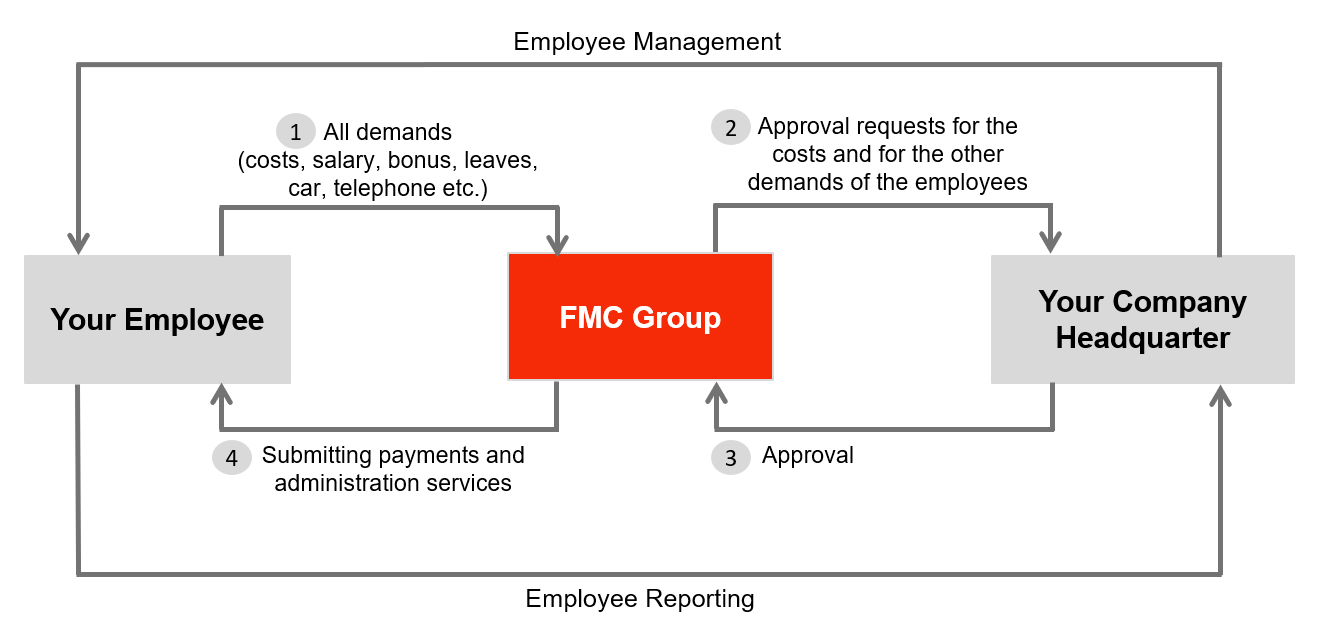
Employer of Record Switzerland
Our Employer of Record in Switzerland service enables clients to hire employees without the need to operate a local legal entity there.
It makes a big difference to develop a new market with your own personnel on the ground. Particularly for functions related to sales & marketing, business development, distributor management, and service & maintenance, our customers are very satisfied using our Switzerland Employer of Record Service.
Our customers and their local teams can be free of the distractions of administrative tasks and complex local requirements. So you can fully focus on the development of your core business.
If your local business grows large enough, you can easily transfer the employees to your own subsidiary. It also provides a quick exit strategy if necessary. In addition to Switzerland, we offer Employer of Record services in several other countries.
Content:
- Employer of Record Switzerland – FMC Group’s Approach
- Hiring an Employee
- Income Tax
- Typical Benefits
- Visa for the Employees
- Time off Policies
- Terminating an Employee

Get in touch with us

Employer of Record Switzerland - FMC Group's Approach
- Quick, flexible, and easy entry into Switzerland in compliance with local employment laws
- Complete control over business development with your own team
- Good option for building up, managing, and supporting your distributors and key accounts by directly observing local developments and adjusting the strategy whenever necessary
- Using our comprehensive recruitment experience for international clients, we can form a local team that fits your corporate culture.
- Focusing on your core business instead of dealing with the time-consuming and complex local administrative tasks
- Allowing for easy market exit if necessary
- Integrating your employees into our team through motivational events and special meetings
EOR Switzerland Management & Reporting Flow

Hiring an Employee
When recruiting employees in Switzerland, it’s crucial to acknowledge the regional variations in spoken languages. While many Swiss candidates are proficient in multiple languages, it’s essential to clearly specify the required language for the role you’re seeking to fill. Once this is established, you’ll discover that Switzerland boasts a modest yet highly educated and skilled talent pool. Recruitment efforts in Switzerland primarily rely on job boards, corporate websites, networking, or newspaper advertisements to identify potential candidates.
Employment Contract – indefinite vs. fixed term
Switzerland’s legal framework for employer-employee agreements is multifaceted, encompassing significant legislation such as the Federal Code of Obligations, which oversees contracts and their termination. Additionally, the Federal Labor Act delineates employment terms and conditions. Swiss employment contracts must encompass essential elements, including but not limited to working hours, remuneration, benefits such as paid leave, bonuses, probationary periods, as well as clauses pertaining to termination and severance.
It’s essential for both employers and employees to carefully review and understand the terms of any employment contract before signing, as they establish the rights and obligations of both parties during the employment relationship
Probation Period
The standard probation period in Switzerland typically ranges from one to three months. Once the probation period concludes, the employee becomes entitled to the benefits and other entitlements outlined in the employment contract. However, it’s important to note that there is no specific protection for employees in cases of dismissal related to illness, pregnancy, or accidents during this period. Termination of employment during probation can occur with a seven-day notice period.
Work Week, Overtime & Maximum Working Hours
The typical workweek in Switzerland typically spans 40 to 42 hours, while office workers are generally limited to a maximum of 45 hours per week.
The regulations regarding statutory and contractual overtime are as follows:
- Individuals working overtime must not surpass two hours per day.
- For employees working a 50-hour week, the yearly overtime limit is 140 hours.
- For employees working a 45-hour week, the yearly overtime limit is 170 hours.
- The responsibility lies with the employees who opt for overtime, and they must promptly inform the employer.
- Overtime compensation is set at a minimum rate of 25% higher than regular pay.
Income Tax
In Switzerland, the Federal government implements a progressive income tax system. This entails dividing an individual’s income into various brackets, which are determined by factors such as marital status and whether they have children. As income increases, tax rates also increase accordingly within these brackets.
| Taxable Income (CHF) | Tax rate |
| Up to 14,500 CHF | 0% |
| Between 14,500 CHF – 31,600 CHF | 0.77% |
| Between 31,600 CHF – 41,400 CHF | 131.65 CHF plus 0.88% over 31,600 CHF |
| Between 41,400 CHF – 55,200 CHF | 217.90 CHF plus 2.64% over 41,400 CHF |
| Between 55,200 CHF – 72,500 CHF | 582.20 CHF plus 2.97% over 55,200 CHF |
| Between 72,500 CHF – 78,100 CHF | 1,096 CHF plus 5.94% over 72,500 CHF |
| Between 78,100 CHF to 103,600CHF | 1,428.60 CHF plus 6.6% % over 78,100 CHF |
| Between 103,600 CHF – 134,600 CHF | 3,111.60 CHF plus 8.8% over 103,600 CHF |
| Between 134,600 CHF – 176,000 CHF | 5,839.60 CHF plus 11% over 134,600 CHF |
| Between 176,000 CHF – 755,200 CHF | 10,393.60 CHF plus 13.2% over 176,000 CHF |
| Over 755,200 CHF | 86,848 CHF plus 11.5 % over 755,200 CHF |
The income tax thresholds for a married couple or a single individual with a child are as follows:
| Taxable Income (CHF) | Tax rate |
| Up to 28,300 CHF | 0% |
| Between 28,300 CHF – 50,900 CHF | 1% |
| Between 50,900 CHF – 58,400 CHF | 226 CHF plus 2% over 50,900 CHF |
| Between 58,400 CHF – 75,300 CHF | 376 CHF plus 3% over 58,400 CHF |
| Between 75,300 CHF – 90,300 CHF | 883 CHF plus 4% over 75,300 CHF |
| Between 90,300 CHF – 103,400 CHF | 1,483 CHF plus 5% over 90,300 CHF |
| Between 103,400 CHF – 114,700 CHF | 2,138 CHF plus 6% over 103,400 CHF |
| Between 114,700 CHF – 124,200 CHF | 2,816 CHF plus 7% over 114,700 CHF |
| Between 124,200 CHF – 131,700 CHF | 3,481 CHF plus 8% over 124,200 CHF |
| Between 131,700 CHF – 137,300 CHF | 4,081 CHF plus 9% over 131,700 CHF |
| Between 137,300 CHF – 141,200 CHF | 4,585 CHF plus 10% over 137,300 CHF |
| Between 141,200 CHF – 143,100 CHF | 4,975 CHF plus 11% over 141,200 CHF |
| Between 143,100 CHF – 145,000 CHF | 5,184 CHF plus 12% over 143,100 CHF |
| Between 145,000 CHF – 895,800 CHF | 5,412 CHF plus 13% over 145,000 CHF |
| Over 895,800 CHF | 103,016 CHF plus 11.5 % over 895,800 CHF |
Typical Benefits
- Healthcare: Switzerland boasts a top-tier healthcare system, offering universal coverage. All residents must possess health insurance, granting them access to a diverse array of medical services and facilities.
- Pension: Switzerland operates a compulsory occupational pension scheme, referred to as the second pillar, complementing the state pension (first pillar). Both employees and employers contribute to this pension fund, ensuring retirees’ financial stability.
- Annual Leave: Swiss workers typically enjoy four weeks of paid vacation annually, affording them abundant opportunities for leisure and rejuvenation.
Visa for the Employees
Whether you can live and work freely in Switzerland depends on your nationality. Swiss nationals, citizens of European Union (EU) member states, and nationals from European Free Trade Association (EFTA) countries have this privilege. However, individuals from countries outside of these categories require a valid work permit to reside and work in Switzerland.
There are five types of work permits available to third-country nationals seeking employment in Switzerland:
- L Permit: The L Permit is a short-stay work permit issued to foreign nationals with a valid employment contract lasting between 3 to 12 months only. EU/EFTA nationals can freely enter Switzerland for up to three months to seek employment that qualifies for an L or B work permit, whereas third-country nationals must obtain a work visa before arriving in Switzerland.
- B Permit: The B Permit is a residence permit granted to individuals with either a permanent or fixed employment contract lasting longer than 12 months. EU/EFTA nationals must renew this permit every five years, while third-country nationals must renew it annually.
- C Permit: The C Permit is issued to foreign residents who have lived continuously in Switzerland for five years (for EU/EFTA nationals) or 10 years (for third-country nationals).
- Ci Permit: The Ci Permit is designated for spouses or children under the age of 21 of foreign workers employed by international organizations or permanent missions in Switzerland. This permit provides access to the Swiss labor market.
- G Permit: Foreign nationals residing in a border country to Switzerland and commuting weekly for work are issued the G Permit.
Time off Policies
Public Holidays
Paid public holidays in Switzerland are determined by individual cantons (states). Some of the notable holidays include:
- New Year’s Day
- Good Friday
- Easter Monday
- Ascension Day
- Whit Monday
- Swiss National Day
- Christmas Day
- St. Stephen’s Day
Annual Leave
Employees receive payment for annual leave, sick leave, and working on public holidays.
An employee is entitled to four weeks of paid vacation per year.
Sick Leave
An employee is granted paid sick leave of 21 days during the first year of employment. In the second year, they can take between one and two months off, and in the third year, they are eligible for eight or nine weeks of sick leave.
Furthermore, employees may be entitled to additional paid sick leave and unpaid leave, depending on the regulations of the canton.
Employees are required to submit sick leave notes within three days of their absence.
Other Leave Types
- Maternity Leave: A female employee is entitled to receive three months of paid maternity leave. This entitlement is guaranteed provided the individual has been employed and has contributed to social security.During maternity leave, women can receive 80% of their pay for up to 14 weeks, except in Geneva where the allowance extends to 16 weeks. While there isn’t a legally mandated paternity leave, some companies may offer it at their discretion.New mothers are entitled to special allowances, such as exemption from physical labor and night shifts, to safeguard their health. These benefits, including maternity and paternity leave, are covered under the social security scheme.
Terminating an Employee
Termination of Service: The termination of an employment contract in Switzerland can happen through various means, including:
- Mutual agreement
- Initiative from either party
- In the event of the employee’s death
- Upon the expiration of the contract
- For other justified reasons
The notice period for termination can vary based on the length of the employee’s service:
- Employees on probation: 7 days
- Employees with up to one year of employment: One month
- Employees with between two and nine years of employment: Two months or as stipulated in the contract
- Employees with more than 10 years of employment: Three months
Disclaimer: Although we carefully researched and compiled the above information, we do not give any guarantee with respect to the actuality, correctness, and completeness.
